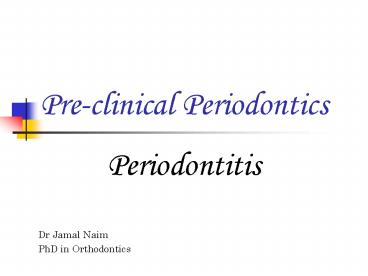Pre-clinical Periodontics - PowerPoint PPT Presentation
1 / 30
Title:
Pre-clinical Periodontics
Description:
Pre-clinical Periodontics Dr Jamal Naim PhD in Orthodontics Periodontitis Classification of periodontal diseases Gingivitis versus Periodontitis Gingivitis is the ... – PowerPoint PPT presentation
Number of Views:282
Avg rating:3.0/5.0
Title: Pre-clinical Periodontics
1
Pre-clinical Periodontics
Dr Jamal Naim PhD in Orthodontics
Periodontitis
2
Classification of periodontal diseases
3
Gingivitis versus Periodontitis
- Gingivitis is the inflammation of a periodontium
with no attachment loss or with previous
attachment loss that is stable and not
progressing. - Periodontitis is the inflammation of a
periodontium caused by specific microorganisms
resulting in progressive destruction of the PDL
and alveolar bone (attachment loss) with pocket
formation, recession or both.
4
Gingivitis versus Periodontitis
5
Periodontitis
- Chronic Periodontitis
- Aggressive Periodontitis
- Periodontitis as a Manifestation of Systemic
Diseases - Associated with hematological disorders
- Associated with genetic disorders
- Not otherwise speci?ed (NOS)
6
Chronic Periodontitis
- Also known as adult periodontitis
- The most common form of periodontitis
- Most prevalent in adults (about 35??????), can
occur in children - Associated with plaque and calculus accumulation
- Subgingival calculus is frequently found
- Slow to moderate progression of destruction
7
Chronic Periodontitis
- Clinical characteristics
- Microbial plaque formation
- Periodontal inflammation
- Loss of attachment and alveolar bone
8
Chronic Periodontitis
Normal
moderate
Severe
9
Chronic Periodontitis
- Subclassified into
- Localized chronic periodontitis (lt 30 of sites
involved) - Generalized chronic periodontitis (gt 30 of sites
involved) - Slight chronic periodontitis 1 to 2 mm clinical
attachment loss - Moderate chronic periodontitis 3 to 4 mm of
clinical attach. loss - Severe chronic periodontitis 5 mm of clinical
attachment loss
10
Chronic Periodontitis/generalized
11
Chronic Periodontitis
- Some factors cause an increase of disease
progression - Local factors influence the plaque accumulation
- systemic factors influence the host response
- Environmental factors such as smoking and stress
influence also the host response - No clear evidence for genetic predisposition???
12
Aggressive Periodontitis
- Clinically healthy patient
- Rapid rate of disease progression
- Absence of large accumulations of plaque and
calculus - Family history (genetic predisposition)
- Diseases sites often infected with actinobacillus
actinomycetemcomitans - Abnormalities in phagocyte function
- Hyperresponsive macrophages
- Self arresting progression
13
Aggressive Periodontitis
14
Aggressive Periodontitis/localized
15
Aggressive Periodontitis/localized
16
Aggressive Periodontitis
17
Aggressive Periodontitis
18
Periodontitis as a Manifestation of Systemic
Diseases
- Influence of host response
- Confusing with other forms
- Normally no major predisposing factors (plaque
etc.) are evident
19
Periodontitis as a Manifestation of Systemic
Diseases
20
Periodontitis as a Manifestation of Systemic
Diseases
21
Periodontitis as a Manifestation of Systemic
Diseases
Papillon lefevre syndrom
22
Classification of periodontal diseases
23
NUG Necrotizing Ulcerative Gingivitis
- Is the most common type of acute gingivitis.
- It has been described since ancient Greek times,
and frequently affected troops fighting in the
trenches during WW1. - Develop quickly eg hours to days
- Usually associated with PAIN, discomfort, perhaps
swelling, fever, feeling unwell
24
NUG Necrotizing Ulcerative Gingivitis
- usually associated with spontaneous gingival
bleeding - require immediate attention
- Other (older) names
- Trench mouth
- Ulcero-membranous g.
- Vincents gingivitis
25
NUG Necrotizing Ulcerative Gingivitis
- Etiology and risk factors
- Caused by specific bacterial groups
- Fusiform bacillus
- spirochetes
- Smoking
- Poor oral health / pre-existing chronic
gingivitis - Stress
- HIV infection
- malnutrition
26
NUG Necrotizing Ulcerative Gingivitis
- Signs
- Cater-like depressions at the crest of the crest
of the interdental papilla - The depressions are necrotic, covered by a gray
(white yellowish) pseudomembranous slough. - Red erythematous halo
- Very severe halitosis
- Spontaneously bleeding gingiva
- May have fever, swollen submandibular lymph nodes
- Increased salivation
27
NUG Necrotizing Ulcerative Gingivitis
Generalised ANUG
Localised NUG
28
NUG and HIV
Non-resolving NUG after conventional treatment
could indicate that the patient has HIV infection
that is progressing to AIDS. The best thing to
do is send the patient to their general medical
practitioner to have blood screen
29
NUP Necrotizing Ulcerative periodontitis
- May be an extension of NUG (different severity
levels) - More commo by immuno-compromised Patients (HIV)
- Clinical appearance same as NUG with
- Presence of attachment loss
- Interdental osseous craters
- No pockets because of recessions
- Etiology same as NUG
30
NUP Necrotizing Ulcerative periodontitis































